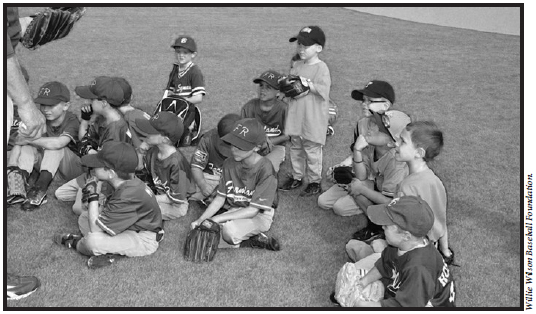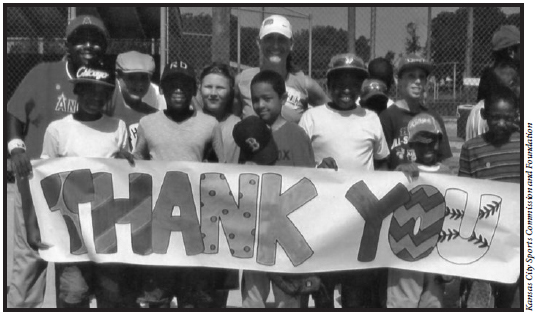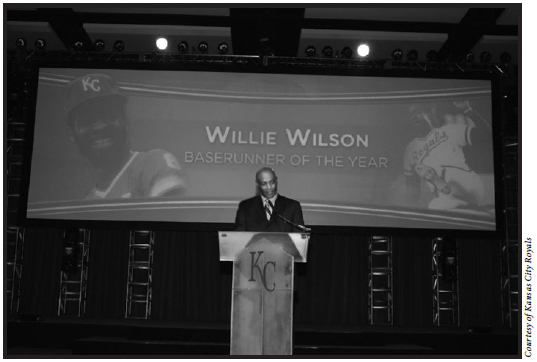
After getting fired from the Diamondbacks, I was up in Canada where Catherine had moved our family. She was from Toronto, and I think she wanted to be near her family while she worked out some things.
I drove from California to Toronto. We were living in the same house, but not really together, if you know what I mean. I was just sort of sitting around and doing nothing. I didn’t know anybody up there.
One day, I think it was in 2004, some time after I had left the Diamondbacks, my buddy Anthony Serrano invited me to come down and visit in New Jersey. While I was there I was watching one of my friend’s kids at a baseball camp.

Youth from Farmland Foods participated in the youth clinic at the Willie Wilson Legends game at CommunityAmerica Ball Park.
Most of the camps back there were being done by college kids. There was one that Don Mattingly held, but he showed up on a Thursday, and I don’t know how long he really stayed there and worked with the kids.
Anthony suggested, “Wouldn’t it be great if we could do a camp in Summit?” I decided why not try it. I went to a lawyer friend of mine to do all the legal stuff to get it right. We decided we would try to put on one camp in August of 2004. We didn’t have any money to really promote anything, but we could print flyers on paper and take them all around town. Donald Davis, another friend, went around with me and we posted the flyers.
Mr. (Dominick) Guida wasn’t working at the recreation center anymore, but he still had some pull there. He got me the fields for almost nothing. So, I had one field for August. People told me it wasn’t going to work because a lot of people go on vacation in August.
That first year about 75 or 80 kids showed up. It worked.
The next year, in 2005, just spreading it by word of mouth, we had three camps. The year after that we did eight straight weeks of camps. I was doing it a little different. We would bring the camps to wherever you wanted to put it on. We were doing camps in Summit, New Providence, Orange, Edison ... but mostly in Summit.
I was doing it with pro players. Bobby Dernier, who had been my neighbor back in Blue Springs, did every camp with me. He had gone to Raytown South and played 10 years in the Major Leagues with the Phillies and Cubs. I would also have Amos there, Mayberry, Fergie Jenkins, Steve Trout – a bunch of different guys.
Bobby saw how it was working in New Jersey, and the next year we did one in his hometown in Raytown.
So, in Jersey it was working well. We’d throw a golf tournament to help raise money so the kids wouldn’t have to pay for all of it. Things seemed to be going well, then I found out the guy I was working with in New Jersey was doing the same thing I had run into with Anthony Ramsaroop. He was taking the money. So, we got rid of him.
Then the Republican mayor wanted me to take pictures with him and all of that. It started to get a little political, and I’m just not into that. I just wanted to help the kids. I didn’t want to be political. It got harder and harder to do it in New Jersey after we had some success, because of longtime grudges. Sometimes, when you are doing things that try to help the community, people don’t care about that. They just want to see you fail.
At one place, Donald Davis went in and tried to get people involved, he got a text message from one of the guys he knew in there, “Does Willie think he is coming back here to take over?” and that kind of stuff. I had a minister back in Summit tell me he was going to say to all the people at his church that they shouldn’t go to the camps since we would not allow him to put out Christian literature.
I’m like, “What the heck man? That’s just hurting the kids.” But people are kind of leery about what you’re trying to do and why you’re trying to do it.
I know this seems strange that I like doing the clinics since I had decided that coaching wasn’t for me, but what I realized is that I didn’t want to be a professional coach. When you’re dealing with 18, 19, 20-year-olds and their egos, it makes it really hard to be a minor-league coach.

Area youth participating in baseball clinic sponsored by Kansas City Sports Commission and Foundation.
The ego tells a kid he is making this amount of money, and no kid thinks they aren’t going to make it to the big leagues. So, when you tell them something about what they’ll have to improve the next year or the next level up they can’t see it. Their egos are big enough to think they had gotten this far doing it their way, so why change. And if you say the wrong thing they call their agent, the agent calls someone else, that person calls the manager, the manager calls you and says, “What did you say to the kid?” And you only told him he had a hitch in his swing or something.
I was probably a little bit the same way when I was a minor leaguer– you know, hard headed.
But when you have a 7- or 8-year-old, they do what you ask them to do and you can teach it to them. They don’t have egos, they just do it. Think about it, if you tell a kid to throw, he just throws. If you tell him to swing, he just swings.
He might do it off the wrong foot, but he does everything you tell him. Then, you make it fun for them by telling them how to do it right. I love teaching the basics because when the basics are right and the light comes on it’s like a different kid. Then the game becomes fun.
So, you teach them how to throw, how to find the seams on the ball so that it will go straight when they throw it, how to point their left hand, how to point their toe. For the guy who’s waiting on the ball, don’t wait like you are standing there catching a bus. When the ball comes to you, we want you to move your legs so you can get in front of the ball and catch it properly.
You tell a kid who is 18-, 19-years-old the same, and they say “Oh, I know that.” Then they do it all wrong and start reaching for things. But those little kids ... they go, “Oh, that works. Then, the game sloooooooows down for them. When you’re doing everything wrong, you’re doing it really quick. When you can slow the game down it becomes easy and fun.
That’s why I love working with kids. When that light comes on their eyes get like saucers. I just love that.
The other thing you learn – and I found this out from my first rookie coach Billy Scripture – is that some people are visual and some are not. So, you take somebody and hold your hand out to the side and start counting down with your fingers as you say it. Five, four, three ...
If the person maintains eye contact with you, that lets you know the kid can concentrate and understand. If the eyes dart back and forth between your hand and your face, you know he is visual. So, you have to coach them differently. If it’s a visual person, you have to put your hands on them and show them how to do something. You can’t just tell them. I was a visual person. So, when I had that breakthrough with my hitting in the Dominican League it was because Manny Mota put his hands on my body and showed me how my shoulders needed to go, where the bat needed to be.
And every time you make a correction with a kid on how to do something, you need to make a little joke or something at the end. You get your point across, and then perk him back up so he doesn’t feel bad.
After all the on-field stuff is done, and then you give them a life-lesson story. For me, I can just tell them my story. I tell them that you can overcome anything you want to overcome, mentally and physically, if you have the right attitude. If the attitude isn’t the right attitude it doesn’t matter what I say. And then, you have to have fun.
I remember Dave Henderson when I was with the A’s. He had fun playing baseball every day. It was just a joy to watch him. A couple of years ago, I had him back to one of my celebrity games. He told me, “You finally get it,” which made me feel really good because for a long time I played the game mad. I didn’t have any fun.
At the end of the clinic, I talk to them about the drugs. I don’t say what drugs because the kids are all pretty smart about what drugs are out there. But you let them know that it’s not something that will help them accomplish anything.
Then you can tell a baseball story about George Brett or Bo Jackson or somebody like that. So, that’s really fun for me to do the clinics.
I was doing all those things in New Jersey, and we did a couple in Kansas City with Bobby Dernier, but I was still living in Toronto. I wasn’t doing anything up there for two reasons. I wasn’t a Blue Jay and I wasn’t Canadian. So, it was pretty hard to get anyone excited about a clinic up there.
I started doing some things with the Negro Leagues Museum in 2005. I was still living in Toronto, but Bob Kendrick, Don Motley and Bob Turnauckas were having me come to Kansas City to do more things. I kept hearing from people that they really missed me and all that.
I came back and did more things from 2006 through 2008 and I kept hearing the same thing: “Willie, you should come back here.” I decided I was going to come back in about 2009.
I met with Toby Cook of the Royals. I had breakfast with him one time, and I was just telling him about me and asking what I needed to do to get back in the Royals’ good graces. Little by little, they would invite me to an event, then another event. Like anything else you gotta prove yourself.
This organization, this management, this group of front office people treat me so much better than the original ones when I was here as a player. Mr. K was great. I can’t say enough good things about him. I always thought John Schuerholz was really straight with me. But some of the other people ... I think they always kind of thought of me as a troublemaker who couldn’t get along with anyone.
When I found out I was really back with the team was at one of the Royals’ “Diamond of Dreams” events when Dayton Moore came over to me. I don’t remember the exact words, but I think he said, “I think you will be pleasantly surprised. We named an award after you for our minor leagues.”
I said, “Really?”
He said, “Yeah,” and then said that there was going to be the Paul Splittorff Pitcher of the Year, the George Brett Hitter of the Year, Frank White Defensive Player of the Year, Dan Quisenberry Special Achievement, Mike Sweeney Award and the Willie Wilson Baserunner of the Year. They have some others, but these were the ones named after former players.
I was really shocked, but also happy. And to know that as long as the Royals are around there is going to be an award with my name on it, makes me really proud. It makes me feel like I have really accomplished something and makes me feel like I’m back in the family.
Now, I do about five or six clinics that the Royals organize. They hire a couple of the alumni players, usually me or Dennis (Leonard) or John (Mayberry) or maybe Monty (Jeff Montgomery) or any of the alumni. It’s a 90-minute event that they do out at the Little K. The kids go from station to station, and then we do an autograph session. I also participate as a coach at the Royals Fantasy Camp in Surprise, AZ.
I have some of my own events also. I have done several celebrity baseball games out at the T-Bones and a couple at the “K.” I usually try to get a Royals team against another team of players who didn’t play for the Royals. It’s a way to get some money for the older players. We made pretty good money when we played, but we weren’t making anything like the kind of money these guys are making today.
We’ll do events wherever you want, at your ballpark ... . or we do a lot of events out at CommunityAmerica Ballpark. For a kid, that’s huge. It’s not “the K,” but it’s a big deal for kids.
Another thing I do with the Royals is that they have an alumni batting practice day. It might be a company or fantasy camp players. They come out to “the K” and take batting practice and fielding, and we tell stories. At the end we get in the dugout and talk to them.
I have done speaking engagements with companies I’m involved with here in Kansas City. Some of them I met through Royals connections, some through the Negro Leagues Baseball Museum. Some during the (2012) All-Star festivities.
I know I made my own bed here before, so I lie in it. But now I see things a lot differently than I did before because I have stepped away from it. People might have told me things in the past, but I wasn’t willing to listen. It just went in one ear and out the other. Nobody could tell me anything.

I was really proud, but really nervous, when I made the first “Baserunner of the Year” award. What an honor.
Now when they stop me and talk with me, I realize they’re genuine. So, why shouldn’t I listen. That’s just being older and having made a lot of mistakes. One thing I found out is if you keep doing the same thing over and over again thinking there is going to be a different result, then you’re crazy.
A lot of people do that – I used to do that.
I’m also involved one-on-one with some people. I have a friend whose son has a drug problem. I have been trying to help him with that, sharing what I went through and what I learned.
We work with charities in the community when we do the baseball games, golf tournaments and other events. We don’t make a lot of money, but it does help create awareness and donations for the charity. I do some things pro-bono to keep my name out there. Using my name to benefit the community makes me feel worthwhile!
I wish I could say that I learned all this when I was much younger.
I’m trying to learn it now. Everything isn’t always great, but it’s pretty good every day.